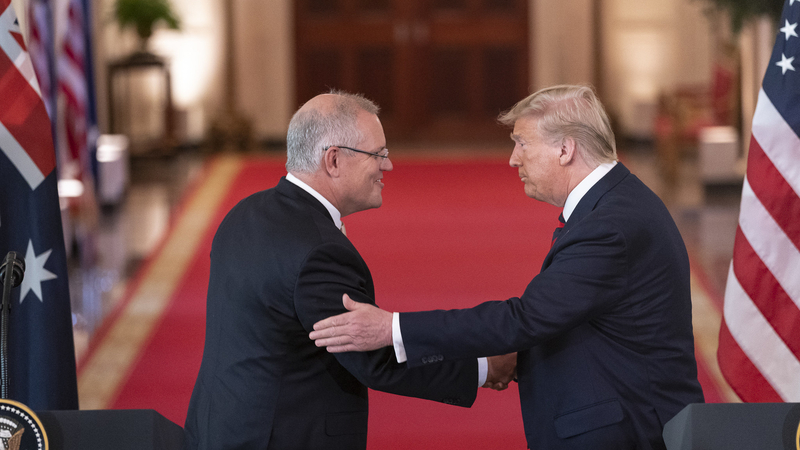Contrary to opinions in China, Australia is not a US lapdog
April 28 2020

Note: This article appeared in the Global Times on April 28 2020. The English version of this article is accompanied by a Simplified Chinese translation.
Last week, Professor Xie Tao, the Dean of the School of International Relations and Diplomacy at Beijing Foreign Studies University and an adjunct at the Australia-China Relations Institute (UTS:ACRI), told me that China-US relations are now at ‘the lowest moment since 1972, when Richard Nixon first visited Shanghai’.
His sobering take caused me to reflect that China-Australia relations don't need to reach the same point but they are heading in that direction. This would be doubly disappointing because Australia leapt ahead of the US and re-established diplomatic relations with China the same year as Nixon's visit.
There's no clearer sign of the frosty relationship between Beijing and Canberra than the absence of a visit to China by an Australian Prime Minister since 2016. For his part, Prime Minister Scott Morrison said he is ‘not waiting by the phone’.
A frank appraisal would concede that an important factor behind the deterioration in China-Australia relations is a widening gap between the assessments that both countries have of their interests.
No amount of diplomatic finessing by the Australian embassy in Beijing will assuage the Chinese government's unhappiness about the decision to exclude Huawei, a global technology leader, from participating in Australia's 5G rollout.
And no amount of protesting by the Chinese embassy in Canberra is likely to change the Australian government's mind that Huawei's participation would present a national security risk that cannot be mitigated.
That said, both capitals deserve credit for allowing - for the most part - Chinese and Australian businesses and households to engage in what each sees as being of mutual benefit.
Two-way trade has never been higher, and China-Australia collaboration has extended into vital new areas such as knowledge creation. UTS:ACRI research shows that last year more Australian scientific publications included a co-author affiliated with an institution in China than any other country.
My friend and Director of the Australian Studies Centre at East China Normal University, Professor Chen Hong, is also correct in pointing out that some of the commentary about China in Australia has been inflammatory and disconnected from facts.
But what is also true, in my view, is that some of the common criticisms about Australia that are regularly made by China-based commentators, and sometimes from the Chinese government, also struggle with the facts.
And to the extent that China-Australia relations deteriorate because of misunderstandings, this is deeply regrettable.
One of the most common allegations I hear is that Australia is an American lapdog.
To be sure, Australia does frequently align itself with US positions. But this is because it's in Australia's interests to do so. The US is Australia's security ally and by far its most important source of foreign investment.
But this does not mean that Canberra's support of Washington is uncritical.
In 2015, then-US President, Barack Obama, called then-Australian Prime Minister Tony Abbott and asked him not to join the China-led Asian Infrastructure Investment Bank. He ignored the advice and Australia joined.
I've lost count of the number of admirals from the United States Indo-Pacific Command in Hawaii that have come to Sydney and asked Australia to run US-style freedom of navigation patrols in the South China Sea. Each time the response has been a polite ‘no’.
The US has defined China as a ‘strategic competitor’. But on September 20, 2019, standing right next to President Trump in the Oval Office during a state visit, Prime Minister Morrison told his hosts that, ‘we have a comprehensive strategic partnership with China…And we have a great relationship with China. China's growth has been great for Australia’.
Three days later in Chicago he told his American audience that ‘the first thing to do is acknowledge that Australia and the US come at this [the China relationship] from a different perspective’.
On issues like the need for internationally agreed to and enforceable rules on governing global trade, Australia is more closely aligned to China's position than US'.
It is true that in the last week senior members of the Australian government have called for greater transparency from China and an independent international inquiry into COVID-19's devastating spread. Given the death toll and rapidly rising unemployment here, many Australians would expect nothing less from their government.
But unlike in the US, Australia's leaders have refused to label COVID-19 the ‘Chinese virus’.
They have also rejected President Trump's approach of withdrawing support from the World Health Organization.
And Prime Minister Morrison has demonstrated a clear understanding of basic COVID-19 facts, telling a radio talk show host trying to stoke Australian anger toward China that ‘the country which has actually been responsible for a large number of these [COVID-19 infections] has actually turned out to be the United States’.
These are not the words and policies of a US lapdog.
Professor James Laurenceson is Director of the Australia-China Relations Institute at the University of Technology Sydney.
与中国存在的看法相反,澳大利亚并非美国的走狗
作者:罗震
北京外国语大学国际关系学院院长兼悉尼科技大学澳中关系研究院客座教授谢韬教授上周跟我讲,中美关系现处于“1972年尼克松访华以来的最低点”。他的冷静分析让我不禁想到,中澳关系虽不至于已达同一低点,但也在向这个方向发展。这令人倍感失望,因为澳洲是在尼克松访华的这一年先于美国与中国重新建立外交关系的。
2016年至今澳大利亚总理尚未访华,这是北京与堪培拉关系冷若冰霜的一个最明显的表现。莫里森总理这方面表示,他“不总等在电话旁”。
任何坦率的分析都会承认,中澳关系恶化背后的一个重要因素是两国对各自利益的评估存在着越来越大的差异。无论如何巧妙外交,澳大利亚驻北京使馆都不会减少中国政府对把华为这个全球技术领先者排除在澳洲5G项目之外的不满。无论如何抗议,中国驻堪培拉使馆都不会改变澳洲政府的看法,即华为的参与将给国家安全带来不可消弥的危险。
尽管如此,值得肯定的是,在认为符合双方利益的情况下,两国(大部分情况下)都允许中国和澳洲的公司及居民相互往来。双边贸易已创新高,中澳合作已拓展到像知识创造这样的新的关键领域。澳中关系研究院的研究显示,去年澳洲发表的科学论著中合著作者里来自中国科研机构的高于来自其它国家。
我的朋友,华东师范大学澳大利亚研究中心主任陈弘教授曾正确指出澳洲的某些关于中国的言论具有煽动性且脱离事实。但是据我看,有种情况也同样存在,那就是在中国的一些时评家,有时甚至是政府部门,对澳大利亚时常做出的一些批评也难说与事实相符。
双方的误解已经一定程度地导致了两国关系恶化,这让人深感遗憾。
我最经常听到的一个说法就是澳大利亚是美国的走狗。
澳大利亚确实常常与美国的立场保持一致,但那是因为这样做符合澳大利亚的利益。美国是澳大利亚的国家安全盟友,到目前为止也是澳大利亚外资的最重要的来源国。
然而这并不意味着堪培拉对华盛顿是一味盲从的。
2015年时任美国总统巴拉克·奥巴马致电当时的澳洲总理托尼·艾伯特,要求他不要加入中国主导的亚洲基础设施投资银行,但是澳洲没有理会这一要求,仍然加入了亚投行。
我难以记清有多少次美国驻夏威夷的印度洋-太平洋司令部的上将们来到悉尼,要求澳大利亚在南中国海实施美国式的自由巡航,然而他们每次得到的答复都是一个礼貌的“不”。
美国将中国定位为“战略竞争者”。可是2019年9月20日,在一次国事访问中,莫里森总理在椭圆形办公室站在特朗普总统旁边说:“我们和中国是全面战略合作伙伴关系...... 我们和中国有非常好的关系。中国的增长对澳大利亚非常好”。三天后在芝加哥他又告诉他的美国听众:“我们首先要做的是,承认澳大利亚和美国在中国关系上有不同的视角”。
在世界贸易规则需得到国际间广泛同意并具可实施性等问题上,澳大利亚的立场更接近中国,而非美国。
确实上周澳大利亚政府的几位高官曾呼吁中国增加透明度,并要求对新冠肺炎的灾难性扩散进行独立的国际调查。面对死亡人数统计和迅速攀升的失业人口数据,许多澳大利亚人都期待政府有起码的表态。
但是不像美国,澳洲领导人拒绝把新冠肺炎称为“中国病毒”,他们也拒绝采取特朗普总统撤销对世界卫生组织支持的做法。并且莫里森总理对新冠肺炎的基本情况表现出很清楚的认识,当一位电台主持人企图将澳大利亚人的怒火指向中国时,总理告诉他 “其实(澳洲)大部分的(新冠肺炎)感染来自美国”。
这些都不是美国走狗会有的言辞和做法。
本文作者为悉尼科技大学澳中关系研究院院长.

